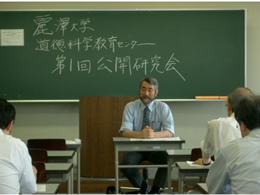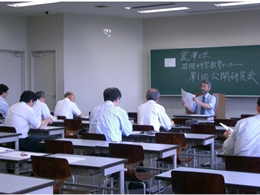The 1st Open Forum of the Center for Moral Science and Education
The first open forum of the Center for Moral Science and Education was held on June 25 (Thu), in Room 1505 of Reitaku University Building #1.
The 1st forum held the presentation of Center Deputy Director Nobumichi Iwasa on the theme “Current status of moral education at elementary and middle schools and Moral Science research at Reitaku University.”
Japanese elementary and middle schools are required to run a “Morality” class for one hour each week. The requirement is stipulated in Japan’s Education Guidelines, defined in 1958. What are the contents of today’s New Education Guidelines?
After glancing through the middle school version of the New Education Guidelines introduced in 2008, participants were asked to take part in two games. In the first game, they were given Guideline items for the first half and second half, and told to put corresponding ones together. The second game was about choosing what tasks are of greater importance for improving moral education. Afterwards, the results of the same games conducted on school teachers across the nation were introduced and analyzed. The conclusion stated that, unless teacher philosophy on moral education changes, moral education at school will not improve.
The Deputy Director went on to say that “Philosophy that deals with the essence of moral education,” which refers to the basic approach to moral education based on each teacher’s way of life, seeks to transcend the framework of school students to teach students about the meaning of life.
As for school teacher complaints on the lack of good teaching materials for moral education, the Director cited the example of video materials used in university classes to explain that, as long as individual teachers have their own philosophy, any subject or event could be used. He then offered his thoughts on the need to overcome the recent trend toward selfishness.
After the presentation, participants shared their thoughts: “Moral education, both at school and at the workplace, should be provided as an enjoyable subject that helps create interpersonal bonds.” “Interpersonal relations based on mutual assistance are not strong enough encouragement. It is necessary to present intangible virtues, such as those of life and love.” “The Clean Campaign implemented in the Moral Science class brought an enthusiasm into the students not shown in regular classes. There should be a long-term and continual program that provides this type of experience in moral science.” A total of 14 people participated, comprised mostly “Moral Science” teaching staff, Moralogy Institute researchers, and members of the Teaching Material Development Office.

Professor Iwasa conducting his presentation

During the presentation



